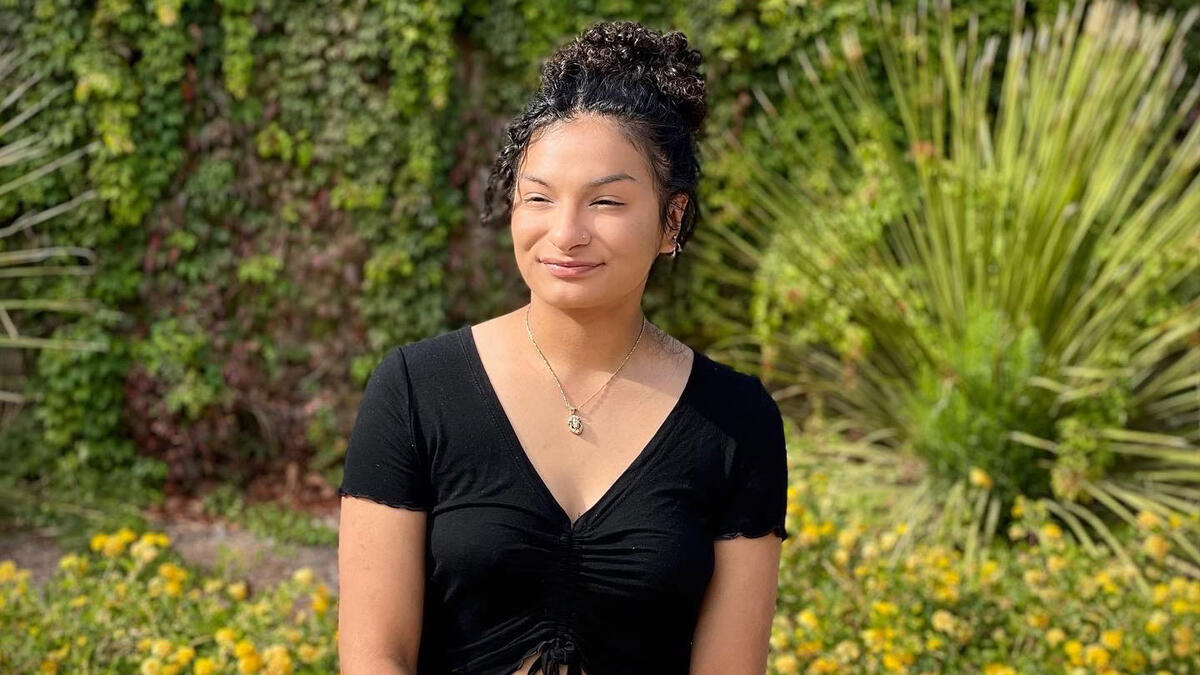Editor's note: This story is part of a series of profiles of notable fall 2021 graduates.
Gabriella Mada has always been drawn to animals, wild or domestic. When the time came to attend college, she chose to major in preveterinary studies.
But, as often happens with majors, she changed her mind and decided it wasn’t for her.
“I have a big heart for animals,” the Phoenix native said. “Love animals, love nature. And I was like, OK, maybe this isn't the path. I switched my sophomore year into what I'm in now.”
Mada, who has been nominated as the Outstanding Undergraduate Student in the College of Integrative Sciences and Arts, will graduate this month with a bachelor's degree in applied biological sciences (natural resource ecology), a minor in sustainability and a certificate in wildlife management. She is continuing on with her education to earn a master’s degree in the same subject via the accelerated 4+1 program.
“After graduation with my graduate degree, I'm hoping to work along the field in a career path related to conservation or in biology,” she said. “So I see myself as a wildlife biologist or maybe a zoologist, a field somewhere in conservation or related to animals.”
Question: What was your “aha” moment when you realized you wanted to study the field you majored in?
Answer: Learning everything that I've learned so far from classes, I was like, wow, this could be what I'm interested in — my calling, I guess you can say. Just the aspect of being able to make a difference — conserving endangered animals or wildlife animals and then global warming. That's a big issue I thought about.
Q: What’s something you learned while at ASU — in the classroom or otherwise — that surprised you or changed your perspective?
A: One of my habitat management courses I took the previous semester, we had a lot of group work and I realized I really liked working with individuals and meeting other students who have like-minded passions. You just learn from what they've experienced or what they know. I've liked working with other students and collaborating.
Q: Why did you choose ASU?
A: Not a lot of Arizona schools have preveterinarian medicine to study. One of the big choices why I chose ASU because I had my major at the time and I had also a full-ride scholarship to come here. (Mada attended ASU on an Obama Scholarship.)
Q: Which professor taught you the most important lesson while at ASU?
A: Dr. Pedro Chavarria. Here at the Poly campus I've had a few classes with him. And then he became my mentor/adviser for my master's. So he's walking me through my applied project and guiding me in the right direction. I would say the best piece of advice I've learned from him is time management is a big struggle or challenge for most students. The piece of advice that he gave me was to set time aside for yourself and really focus on like your mental health as well as trying to juggle everything else. Prioritize yourself and then your studies so you can do better. That was a big chunk of advice that I took to the heart.
Q: What’s the best piece of advice you’d give to those still in school?
A: Keep on going. There's the light at the end of the tunnel! I do promise that your hard work will pay off. I know there's a lot of challenges that students face. But at the end you feel that weight coming off your shoulders. So I tell any student that's in a lower grade or still continuing just keep going. You got this.
Q: What was your favorite spot on campus, whether for studying, meeting friends or just thinking about life?
A: Outside on the Polytechnic campus — well, just outside in general. I love being outside. You hear the background noise, you hear birds. I'm more into nature. I like to feel the sun on me while I'm studying.
Q: If someone gave you $40 million to solve one problem on our planet, what would you tackle?
A: The problem that I’m most concerned about is global warming. Why aren't government officials talking about it? Why are they putting it behind the wheel? So if I was given $40 million and I had to solve a problem, I would put that money towards that issue. 'Cause I really think that's an important thing. It's affecting our wildlife, animals, us, people in general.
Top photo courtesy of Gabriella Mada
More Sun Devil community

A champion's gift: Donation from former Sun Devil helps renovate softball stadium
Jackie Vasquez-Lapan can hear the words today as clearly as she did 17 years ago.In 2008, Vasquez-Lapan was an outfielder on Arizona State University’s national championship-winning softball team,…

Student-led business organization celebrates community, Indigenous heritage
ASU has seen significant growth in Native American student enrollment in recent years. And yet, Native American students make up less than 2% of the student population.A member of the Navajo Nation,…

Remembering ASU physical chemist Andrew Chizmeshya
Andrew Chizmeshya, a computational chemist and materials scientist whose work spanned over three decades at Arizona State University, died on March 7 at the age of 63.A dedicated mentor and cherished…


